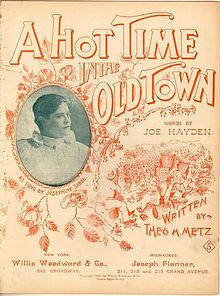Josephine Sabel
Josephine Sabel | |
|---|---|
 Sabel in 1911 | |
| Born | Josephine Domingue Sabel October 3, 1866 Lawrence, Massachusetts, U.S. |
| Died | December 24, 1945 (aged 79) Patchogue, New York, U.S. |
Josephine Domingue Sabel (October 3, 1866 – December 24, 1945) was an American singer and comedian, billed as "The Queen of Song" in vaudeville.
Early life[edit]
Josephine Domingue was born in Lawrence, Massachusetts.[1]
Career[edit]

Sabel was a vaudeville performer for many years, billed as "The Queen of Song."[2] She popularized songs including "A Hot Time in the Old Town Tonight",[3] "Somebody Loves Me", and "Bicycle Built for Two". She also sang "coon songs" that caricatured African-American speech and culture, for example "Bye Bye Belinda" (written by H. Y. Leavitt, billed as a "Darktown Triumph")[4] and "Little Alabama Coon", an 1893 hit song written by Hattie Starr.[5] She continued performing late in her life, as a nostalgia act in the 1930s.[6]
Sabel's Broadway credits included roles in the musicals Punch, Judy and Company (1903), Earl Carroll's Vanities (1925), Oh Please (1925-1926), and Sidewalks of New York (1927-1928).[7] She appeared in several films: Corn Top Bread (1930), The March of Time (1930, unfinished), and Broadway to Hollywood (1933).[8]
Sabel was not known for a pleasing voice, but for her humor and stage presence. "Miss Sabel does not sing much, and never did," explained a newspaper account in 1904, "Most of her singing is yelling, but she yells well."[9] Critic Frank Norris wrote of her, "Josephine Sabel is not what you would call pretty, but she is French to her fingers and toes, which is much better. She can do precisely what she likes with her audiences — making them laugh or weep or whistle at her will."[10] She emphasized her French connections with the latest fashions from Paris, so that her clothing on and off stage were described in detail in the press.[11]
Personal life[edit]
Josephine Domingue married David Sabel, her manager. She died in 1945, aged 79 years, at a care home in Patchogue, New York where she had lived since 1937.[1]
References[edit]
- ^ a b "Josephine Sabel" New York Times (December 25, 1945): 23. via ProQuest
- ^ Frank Cullen, Florence Hackman, Donald McNeilly, eds., Vaudeville Old & New: An Encyclopedia of Variety Performances in America (Psychology Press 2007): 987. ISBN 9780415938532
- ^ "Stage Folk" The International (July 1901): 73.
- ^ "Bye bye Belinda" sheet music (Witmark & Sons 1897), Lester S. Levy Sheet Music Collection, Johns Hopkins University Libraries.
- ^ Linda Dahl, Stormy Weather: The Music and Lives of a Century of Jazzwomen (Hal Leonard Corporation 1984): 7. ISBN 9780879101282
- ^ "Old Time Favorites Appear at Palace" New York Times (July 21, 1930): 21. via ProQuest
- ^ Nancy Marlow-Trump, Ruby Keeler: A Photographic Biography (McFarland 1998): 40. ISBN 9780786405244
- ^ Edwin M. Bradley, The First Hollywood Musicals: A Critical Filmography of 171 Features, 1927 through 1932 (McFarland 2004): 261. ISBN 9780786420292
- ^ "Trained Horses Make a Big Hit" The Indianapolis Star (January 12, 1904): 6. via Newspapers.com

- ^ The Apprenticeship Writings of Frank Norris, 1896-1898, Volume 1 (American Philosophical Society 1996): 20. ISBN 9780871692191
- ^ "At the Theaters" The Capital (February 15, 1902): 16.
External links[edit]
- Josephine Sabel at the Internet Broadway Database
- Josephine Sabel at Find a Grave
- Trav S. D., "Josephine Sabel: The Queen of Song" Travalanche (October 3, 2013). Blog post about Sabel, with photo.
